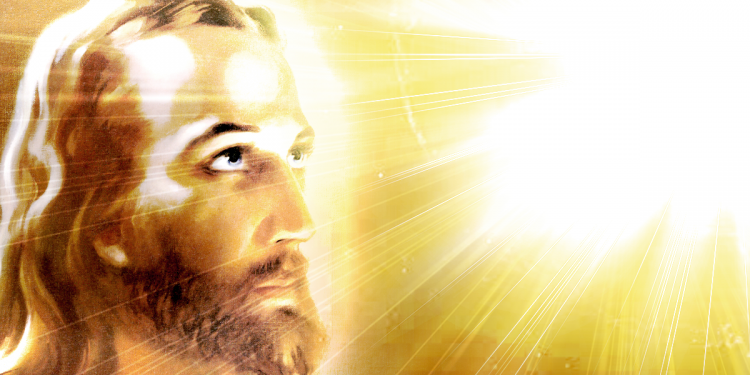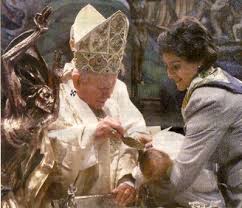Did Christ Have the Beatific Vision from the Moment of his Conception? Pt. 2

In this post, I am going to take a look at what Sacred Scripture has to say about Christ possessing the beatific vision. And after that, we will conclude by answering the question of whether or not this teaching of the Church really matters, and why.
Now, having seen the teaching of the Church on this matter, you may be saying the answers to these questions are obvious from a Catholic and magisterial perspective. Moreover, because of my propensity to get ahead of myself and give you all the answers at the back of the book, I think I’ve already plunged into at least some of the answers to these questions as well.
So, why have I asked you to put up with me for another post, you ask?
In this post, we are going to really dive deep and hopefully see the truth of these matters ever more clearly. And we are going to be better equipped to answer the pertinent questions that arise as a matter of course whenever this topic is on the table of discussion.
So, with that, let’s begin by taking a look at what Sacred Scripture has to contribute to our topic.
What the Bible Says
We’ve already seen the Church put forward remarkably plain declarations from Scripture demonstrating that Jesus had both the beatific vision and the resulting knowledge of God and all that pertains to God and God’s salvific plan that flows from that vision as John 6:46 says, and the CDF cited: “Not that anyone has seen the Father except him who is from God; he has seen the Father”, and John 1:18: “No one has ever seen God; the only Son, who is in the bosom of the Father, he has [revealed] him.” And then there was Matt. 11:27: “… no one knows the Son except the Father, and no one knows the Father except the Son and any one to whom the Son chooses to reveal him.”
We noted before how that John 6:46 and John 1:18 emphasize Jesus to have both “seen” the Father and to presently—during his ministry on earth—to be dwelling “in the bosom of the Father,” and as such the Son has the unique ability to “reveal him [the Father].” It is only because of that “vision” that he becomes “the revealer” of the Father. As the CDF pointed out, you can’t “reveal” the Father in the sense of being the Savior as revealed in the New Testament without “seeing” the Father. And then, Matt. 11:27 emphasizes that Jesus had the beatific “knowledge” of the Father that flows from that vision.
These are clear enough.
But I want to add a few more verses that are perhaps even more plain and that indicate not only that the Son “has seen” the Father, but that he “sees” the Father and possesses the beatific knowledge that flows from that vision as he was speaking and walking the earth 2,000 years ago. And, indeed, he would have had that clear vision and knowledge from the moment of his Incarnation:
First, let’s take a look at John 5:19 “the Son can do nothing of his own accord, but only what he sees the Father doing.”
Fascinating!
Notice, Jesus does not have to “walk by faith” as you and I do. He already possesses God in the beatific vision “seeing the Father” and acting only in accordance with that “sight” as he walked the earth this side of the veil.
Remarkable!
Second, let us consider John 3:13: “No one has ascended into heaven but he who descended from heaven, the Son of man.”
In my book, Behold Your Mother – A Biblical and Historical Defense of the Marian Doctrines, I make four points we would do well to consider now to really appreciate St. John’s Gospel as well as this verse.
1. According to St. Irenaeus, and other Fathers of the Church, John wrote his Gospel with an emphasis on demonstrating the errors of the fathers of Gnosticism and the heresiarch Cerinthus in particular, who—among his many errors—denied the divinity of Christ. Thus, in quoting these words from Jesus he intended to demonstrate that “the Son of man descended” from heaven as the “only begotten Son,” a divine person, sharing his Father’s nature. In other words, “the Son of man,” is the same person who was eternally with the Father in heaven, and who descended to the earth in the Incarnation. Moreover, his point was that even while Christ walked the earth with his disciples in Galilee, he was in possession of heaven as true God and true man.
But how could Christ already possess heaven even in his humanity while he walked the earth? First of all, he says so. Jesus more than implies that “the Son of man”—a term referencing Christ’s humanity—“has ascended into heaven.” This emphasizes the truth that Christ was already experiencing “heaven,” or the Beatific Vision, while he was walking on the earth. His human body would not be glorified until after the resurrection, but, according to John, Christ could already “see” the Father while on earth, as we’ve seen from John 5:19.
Consequently, Jesus, in his human nature, had already “ascended into” or possessed heaven—the Beatific Vision being the essence of what heaven is—even from his mother’s womb. Because he was and is both God and man, he could say that he both “descended” from heaven in the Incarnation and that he had already “ascended” to heaven precisely because as man he had already attained to the possession of God in the beatific from his mother’s womb. In fact, as God “he” had brought about this great mystery by his own power!
As an aside, many ancient manuscripts add “which is in heaven” to the end of this verse, which perhaps makes it even more clear:
No one has ascended into heaven but he who descended from heaven, the Son of man, which is in heaven.
So who is in heaven? “The Son of man!” What is the essence of heaven as we’ve seen? The possession of God in the beatific vision! Thus, St. John telling us “the Son of man” “has ascended into heaven” reveals the fact that Christ had the beatific vision in his human nature at the moment he “descended” to earth in the beatific vision.
The third text I want to look at is one I quoted earlier: John 3:34: Remember this? It reveals to us how God gives the Spirit to Jesus “without measure.” Well, now, take a look at the three verses leading up to that verse:
He who comes from above is above all; he who is of the earth belongs to the earth, and of the earth he speaks; he who comes from heaven is above all. He bears witness to what he has seen and heard, yet no one receives his testimony; he who receives his testimony sets his seal to this, that God is true. For he whom God has sent utters the words of God, for it is not by measure that he gives the Spirit…
Did you notice again the Johannine emphasis on Jesus coming “from above” resulting in him being able to bear “witness to what he has seen and heard?” Again, we have the beatific vision implied. And it is in that context that St. John reveals that God gives the Spirit to Christ without measure!
Fourth, let’s consider John 11:41-43:
And Jesus lifted up his eyes and said, “Father, I thank thee that thou hast heard me. I knew that thou hearest me always, but I have said this on account of the people standing by, that they may believe that thou didst send me.” When he had said this, he cried with a loud voice, “Laz’arus, come out.”
Here, we see a clear reference to the fact that Jesus did not have faith. He had the knowledge of God and of all things that pertain to God as we’ve seen from Pope Pius XII and CCC 473. Notice, this text is set in the context of Jesus raising Lazarus from the dead. He clearly distinguishes his knowledge and everyone else’s faith. Did you notice how Jesus said of himself, “Father, I thank thee that thou hast heard me. I knew that thou hearest me always”? But then he immediately emphasizes the faith of the others when he says, “… but I have said this on account of the people standing by, that they may believe…”
Does This Stuff Really Matter?
There are more biblical texts we should consider, but I really want to get to our final point and I want to spend some significant amount of time on it because it is so important. And this final point comes by way of the question I introduced at the beginning of this post: “Does this stuff really matter? Does it really matter that we believe Jesus to have had the beatific vision from the moment of his conception?”
I want to make five points here to conclude my thoughts:
1. In his great three-book series, “Jesus of Nazareth, Vol. 1,” Pope Emeritus Benedict XVI makes the crucial point that the distinguishing prophetic characteristic of the Messiah according to the prophecy of the Old Testament is that the Messiah would possess the vision of God. The key biblical texts Pope Benedict used were, first, the famous prophecy spoken by Moses himself in Deut. 18:15: “The LORD your God will raise up for you a prophet like me from among you, from your brethren — him you shall heed.”
What was it that distinguished Moses from all other prophets? Not his miracles. There were lots of miracles performed by other prophets, even the raising of the dead, in the cases of Elijah and Elisha, which Moses did not do. The distinguishing gift in the life of Moses was his “seeing” God. And this was not just in a dream or an anthropomorphic vision “high and lifted up with his train filling the temple” as Isaiah in Isaiah 6, but in some sense he “saw God!” In Ex. 33:23 we read: “You shall see my back; but my face shall not be seen.” I know this is a matter of speculation, but I do not believe this “vision” was the beatific vision as some argue, but it is a mysterious category that is beyond any of the other prophets and is fulfilled only in the beatific vision of Christ. The reason why I do not believe it was the beatific vision is because of the use of terms of exclusivity in both Scripture and Magisterial documents concerning Christ having the beatific vision as we saw before. Notice, John 1:18 says, “No one has ever seen God; except the only-begotten Son.” Pope St. John Paul’s Novo Millenio Ineunte, 26, provides:
Christ alone, who sees the Father and rejoices fully in him, can understand completely what it means to resist the Father’s love by sin.
Remember those quotations? We’ve seen them before. However, we do see, in Ex. 34:29, the “vision” Moses did experience in a category all by itself, when he “talked with God,” “saw God,” and this caused “the skin of his face” to shine!
Remember Charlton Heston, folks? The Ten Commandments? If you haven’t seen the movie, you should!
At any rate, Jesus is the fulfillment of the prophecy of Deut. 18:15 principally because of his “seeing the Father.” Yes, the miracles and prophecies were also crucial to fulfill the criterion of being the Messiah, but his “vision” or “sight” of God is the distinguishing characteristic, according to Pope Emeritus Benedict XVI.
This is crucial from a biblical perspective.
My second point—is really my last point, but I will make it in what are essentially four sub-points of this second point, and I think these will really bring home why Jesus Christ having the beatific vision is crucial to our Catholic Faith. The bottom line here is: You make mincemeat of both our Christology and our Soteriology (the study of salvation) if you deny it:
Point #2 of our final five points: If Christ does not possess the beatific vision in his human nature, which is the essence of what final salvation is, then he is no longer the savior for at some point at least he would have needed to be saved first. Don’t get me wrong here, folks, God could have chosen to use even a less-than-perfect instrument to save us. In fact, he could have just declared “I forgive you” and saved us! There are any number of ways God could have saved us because he is omnipotent as I said before. But we are considering what is revealed to be his plan of salvation. And according to the revelation we have been given, Jesus is not just an instrumental cause of our salvation that himself had to be saved. He is the Savior! According to the teaching of the Church, without the vision of God, he could not be the first cause or the efficient cause of our salvation. He would have had to have been actualized in the beatific vision himself. This is huge, folks! In losing the beatific vision of Christ, you lose Christ as savior!
In fact, one of the essential errors of Fr. Jon Sobrino that was condemned as error by the CDF was his notion quoted in part VI of the Notification of the CDF that Christ “was not the efficient cause of salvation, rather the symbolic cause.” He was purely an example for us; not the strict cause! The CDF’s response to this point is telling:
Of course, there is great value in the efficacious example of Christ, as is mentioned explicitly in the New Testament. This is a dimension of soteriology which should not be forgotten. At the same time, however, it is not possible to reduce the efficacy of the death of Jesus to that of an example or, in the words of the Author, to the appearance of the homo verus, faithful to God even unto the cross. In the cited text, Father Sobrino uses phrases such as “at least in this sense” and “is shown more in the form,” which seem to leave the door open to other considerations. However, in the end this door is closed with an explicit negation: “it is not efficient causality but symbolic causality” [causalidad ejemplar]. Redemption thus seems reduced to the appearance of the homo verus, manifested in fidelity unto death. The death of Christ is exemplum and not sacramentum (gift).
Point #3: The CDF also points out, if Jesus did not have the beatific vision, he is no longer “the revealer” of the face of the Father, in a strict sense, because he would not possess the vision of the face of the Father to reveal:
The filial and messianic consciousness of Jesus is the direct consequence of his ontology as Son of God made man (Fr. Galot did the same thing that Sobrino does in his works, poo-pooing the notion of “beginning with a priori arguments from ontology” that end up denying Scripture! Back to CDF) If Jesus were a believer like ourselves, albeit in an exemplary manner, he would not be able to be the true Revealer showing us the face of the Father… For Father Sobrino, in fact, the unique character of the mediation and revelation of Jesus disappears: he is thus reduced to the condition of “revealer” that we can attribute to the prophets and mystics.
I cannot adequately express the importance of this fact. Without the beatific vision, Christ is not only not the Savior, but he is not “the revealer” of who God is. Folks, this is one of the central reasons why Jesus came to earth. To “reveal” to us who God is: Father, Son, and Holy Spirit! According to John 17, this is at the core of his mission! For lack of time, I will give you homework to read the entire prayer of John 17! For now, I will cite just verse 26, “Father, I have made known to them your name and I will make it known.” What Name? “Father!”
Point #4: This understanding of the necessity of Christ possessing the beatific vision in order to be the savior is precisely why Pope St. Gregory the Great declared anyone who belonged to a heretical sect called the “Agnoetes” (transl. “Not knowing”) end up Nestorian. They, along with many today, misunderstood and misunderstand Mark 13:32, “But of that day or that hour no one knows, not even the angels in heaven, nor the Son, but only the Father…” Pope Gregory said anyone who interprets this to mean the Son of God did not have the intellectual knowledge in his human nature of the day or the hour ends in Nestorianism! Why? Let’s go back to CCC 473 to get our answer:
The human nature of God’s Son, not by itself but by its union with the Word, knew and showed forth in itself everything that pertains to God.” Such is first of all the case with the intimate and immediate knowledge that the Son of God made man has of his Father.
If Jesus did not have the knowledge of his Second Coming, then he would have to be moved from potency to act—imperfection to perfection—by something or someone outside of himself! You’ve just created another subject in Christ, which is absurd! His intellectual perfection would not be “the direct consequence of his ontology as Son of God made man” as we saw from the CDF. And this leads to all sorts of problems Christologically! He would no longer be “the author and perfecter of our faith” of Hebrews 12:1-2. He would have to be perfected himself. There would be a defect in the hypostatic union, which is a substantial union. Thus, a defect in God. That, again, is absurd. As I said before, you’ve created what is tantamount to another subject in Christ a la Nestorius. As St. Thomas Aquinas points out, he would no longer be the one St. John reveals to be “full of grace and truth” in John 1:14! “And the word was made flesh, full of grace and truth.” And notice, this verse is given in the context of the revelation of the incarnation/hypostatic union. He didn’t “become” full of grace and truth later! In fact, if he did not have the beatific vision he would no longer be the one, St. John describes just two verses later:
And from his fullness have we all received grace upon grace (John 1:16).
One might ask, “How can Jesus possibly be the one who ‘from his fullness’ we receive ‘grace upon grace?’ That is, how could he be the source of all grace?” Just read two verses forward one more time and St. John tells us. It is because of the beatific vision of God he alone possesses this side of the veil:
No one has ever seen God; except the only-begotten Son, who dwells in the bosom of the Father, has revealed him!
Problem of Mark 13:32 and the Knowledge of Christ
“This sounds good, Tim, but if this is true, what did Jesus mean by ‘not even the Son’ knew when he would come again in Mark 13:32? And doesn’t the CCC 474 say he did not know?”
Actually, it does:
By its union to the divine wisdom in the person of the Word incarnate, Christ enjoyed in his human knowledge the fullness of understanding of the eternal plans he had come to reveal. What he admitted to not knowing in this area, he elsewhere declared himself not sent to reveal.
Yes! Christ “did not know” the hour of his second coming! But this has to be understood properly and in context. The Catechism of the Catholic Church had already stated in paragraph 473 as we’ve seen:
The human nature of God’s Son, not by itself but by its union with the Word, knew and showed forth in itself everything that pertains to God.
And even more importantly, I did not quote the first sentence in CCC 473, which even more clearly states: “But at the same time, this truly human knowledge of God’s Son expressed the divine life of his person,” and footnotes Pope St. Gregory the Great who answers this very question and demonstrates how Mark 13:32 does not mean Jesus did not know the hour of his own return in his human nature. It means he did not know it from his human nature.
Again CCC 473 already said, “The human nature of God’s Son… knew and showed forth in itself everything that pertains to God.” Notice, in agreement with Pope St. Gregory the Great, the human nature knew it in itself—but not from itself. This is why CCC 473 also says this knowledge of “everything that pertains to God” was known, and it is italicized for emphasis, as I cited it above, “… not by itself but by its union with the Word.”
Here is the bottom line: Remember, Mark 13:32 was set in the context of Mark 13:4 where the apostles ask the question, “when will the consummation of all things be?” And remember, the apostles as well as many zealots wanted to hasten that day by making Jesus King! Either by exhortation as in the case of St. Peter in Matt. 16:22, “Not so Lord, this will never happen to you!” Of course, St. Peter is discouraging Christ from going to the cross. He wants a kingdom now! Or, after the miracle of the loaves when the mob wanted “by force to make him king” (in John 6:15). The key is, as Pope Gregory declared and the CCC footnotes in CCC 473:
1. Pope St. Gregory says Christ does not know this from his human nature; rather, he knows it in his human nature by virtue of the hypostatic union as we saw from CCC 473. So was he lying when he says he did not know it? Absolutely not! He didn’t know it from his human nature.
2. He emphasizes what he knows from his human nature because, in context, he is emphasizing in answer to the apostle’s loaded question that the timetable for his Second Coming is the prerogative of God and is not subject to human manipulation. Even Christ’s perfect humanity considered by itself cannot alter God’s timetable because this is not a matter subject to human—even perfect human–machination! In fact, later, in Acts 1:7, Jesus gets even more explicit of the sense in which he says “even the Son does not know” when he says, and in response to an even more explicit reference to the same question the apostles asked back in Mark 13: “Lord, will you at this time restore the kingdom to Israel?” Our Lord responds, “It is not for you to know the times or seasons which the Father has fixed by his own authority.” As CCC 474 also says, Jesus here clarifies that he was not sent to reveal this to them! And that is the will of the Father that, again, even a perfect human nature cannot either know by itself or alter by its own authority.
There are other possibilities given by Pope St. Gregory the Great as possible that are of lesser weight from an apologetic perspective. For example, Pope Gregory says he may have said “he does not know it” in the same way we may say, “Oh, happy day!” It is not the day that is happy, but we say that because the day makes us happy! “The Son does not know” in the sense that he is not going to reveal it to them so that they would know!
There is also the possibility that Christ was using a kind of mental reservation. “I don’t know it in the sense that I have not been sent to reveal it; therefore, I don’t know it for you.”
These latter two are the weaker arguments, but perfectly licit for Catholics to teach as Catholic theology. However, what is not licit is to say Jesus Christ did not know this in his human nature. It is correct to say he did not know it from his human nature.
So does Jesus know the time? No, if we consider the question from the perspective of does he know it from his human nature which would make it merely a “human” consideration that is able to be manipulated by human power. That is what Jesus was considering in Mark 13:32. The answer is yes, if we consider it from the perspective of does he know it either from his divine nature, as a divine person or in his human nature joined to the divine nature in the hypostatic union.
In pondering the controversy surrounding this topic in the modern Church, it dawned on me. Everyone involved in this controversy—at least those who believe Jesus is God, anyway—understands that we have to qualify what Jesus means by “the Son” not knowing because all Christians know the answer to the question if we consider Christ’s divine nature or his divine person. There is nothing he doesn’t know. The real question is only whether he also knew it by virtue of the hypostatic union in his human nature. And the answer is yes. Again, he did not know it from his human nature because that knowledge is beyond the realm of what even a perfect human nature can know (and therefore manipulate) by itself. But it is known in the human nature hypostatically joined to the Divine Person.
Objection!
Some will respond at this point: “What about the kenosis? Did not Jesus ‘empty himself’ of his divine glory in becoming man? Why couldn’t Jesus have also ‘emptied himself’ of the beatific vision when he was Incarnate?”
Great Question! It is true, Jesus did “empty himself” of his divine glory so that we can sing at Christmas every year “veiled in flesh the Godhead see! Hail the incarnate Deity!” “Though he was in the form of God, he did not think his equality with God something to be clung to; rather, he emptied himself (Gr. kenosis) taking upon himself the form of a slave” (Phil. 2:5ff).
Amen! Not only did he empty himself of his divine glory, but he emptied himself of much that was his right by virtue of the beatific vision that he possessed. As I said before, consolation and elation in his emotions, glory, impassibility, subtility, agility, and more. He had to empty himself of at least some of these gifts that were his by right (glory and impassibility) because he also had to be “wayfarer.” Merit depends on having to overcome obstacles in a wayfaring state that only exists this side of the veil of death. He had to experience, for example, the physical and emotional revulsion at the thought of the cross and all of the associated pain, both physical and spiritual! He had to overcome and so merit salvation not for himself but for all of us.
I must emphasize the point that Jesus didn’t merit salvation or glory for himself. The transfiguration is one proof among many of that. Ever notice that leading up to the transfiguration of Matt. 17, you have the preceding verses of Matt. 16:27ff?
For the Son of man is to come with his angels in the glory of his Father, and then he will repay every man for what he has done. [28] Truly, I say to you, there are some standing here who will not taste death before they see the Son of man coming in his kingdom.” [17:1] And after six days Jesus took with him Peter and James and John his brother and led them up a high mountain apart. [2] And he was transfigured before them, and his face shone like the sun, and his garments became white as light.
“The Son of man coming in his kingdom” is not only a reference to his Second Coming, but also a reference to the transfiguration where Peter, James, and John would get a taste of what was to come. And we, I might add, would see revealed the fact that “glory” already belonged to Christ by right. He gave that up for our salvation, as I’ve said.
Having said all of that, I must also make clear that just as there are some things Jesus had to give up in order to be our savior, there are others he could not give up and remain our savior. As we’ve seen, he had to be “comprehensor,” that is, he had to have the beatific vision, in order to be savior because you can’t give what you don’t have! He is the first cause of salvation. He is the savior. Moreover, and as Pope St. John Paul pointed out in Advenio Millennio Ineunte that we saw before, Jesus also had to have the beatific vision in order that he could fulfill the prophesy of Isaiah 53:4: “Surely he has borne our griefs and carried out sorrows.” He could not bear our sins if he did not know and experience their full weight. And that can only be possessed in the beatific vision.
So in the end, there were some things he had to “empty himself” of in order to be our savior. But there were other things that he could not empty himself of and remain our savior. The beatific vision is one of those things he could not empty himself of.
Point #5:
CCC 517 gives us yet another reason why losing the beatific vision of Christ makes mincemeat of faith, and specifically our soteriology (theology of salvation):
Christ’s whole life is a mystery of redemption. Redemption comes to us above all through the blood of his cross (Eph. 1:7; Col. 1:13-14; I Peter 1:18-19), but this mystery is at work throughout Christ’s entire life:
– already in his Incarnation through which by becoming poor he enriches us with his poverty (II Cor. 8:9);
– in his hidden life which by his submission atones for our disobedience (Luke 2:51);
– in his word which purifies its hearers (John 15:3);
– in his healings and exorcisms by which “he took our infirmities and bore our diseases” (Matt. 8:17-Isaiah 53:4);
– and in his Resurrection by which he justifies us (Romans 4:25).
Notice, how Christ’s entire life was redemptive, not just the cross? This is crucial for us to understand. Don’t get me wrong here, folks, as Hebrews 9:22 says, “Without the shedding of blood there is no remission of sins.” The cross represents the pinnacle of the redemption. But Christ was redeeming us from the womb to the tomb and beyond! Protestants generally do not understand this. And they even further do not understand that our entire lives are salvific as well! Salvation, justification, and sanctification are all processes whereby we are transformed into the image of the Son of God and if we endure until the end we will finally be saved (Matt. 10:22; Rev. 2:10). In fact, the great St. John Eudes sums this up nicely quoted in CCC 521, wherein he says:
We must continue to accomplish in ourselves the stages of Jesus’ life and his mysteries and often to beg him to perfect and realize them in us and in his whole Church… For it is the plan of the Son of God to make us and the whole Church partake in his mysteries and to extend them to and continue them in us and in his whole Church. This is his plan for fulfilling his mysteries in us (Liturgy of the Hours, Week 33, Friday, Office of Readings).
A full discussion on justification/salvation is beyond what we can do in this post, but the most important thing to note for our purpose now is this: According to CCC 517, just as Christ was redeeming us when he “submitted to his parents” in Luke 2:51-52, in his ministry of healing both bodies and souls in Matt. 8:14-17, and John 15:3, on the cross (Eph. 1:7), of course, and through his resurrection (Rom. 4:25), he was also redeeming us from the moment of his Incarnation:
For you know the grace of our Lord Jesus Christ, that though he was rich, yet for your sake he became poor, so that by his poverty you might become rich (II Cor. 8:9).
In order to merit from the moment of his Incarnation, he had to be able to know and freely will in his human nature. Thus, from the moment of the Incarnation he began to merit eternal life for us. From his first act of being in the womb, the Second Person of the Blessed Trinity “humbled himself” as Phil. 2:8 says it. The Incarnation was an infinite act of humiliation on God’s part. But there could be no merit on God’s part until the incarnation. God can’t merit. There is no obstacle for God to overcome. However, Christ chose to “become poor” and remain poor, so that we could be “made rich” in him. He could merit because he acquired a human nature. But without the beatific vision in that human nature from the moment of his conception, he could not merit our redemption/salvation. Thus, CCC 517 makes no sense at all.
Two final points:
1. Can we see why Christ having the beatific vision was kind of important?
2. Can we see why Jesus was not “just a slob like one of us?”





